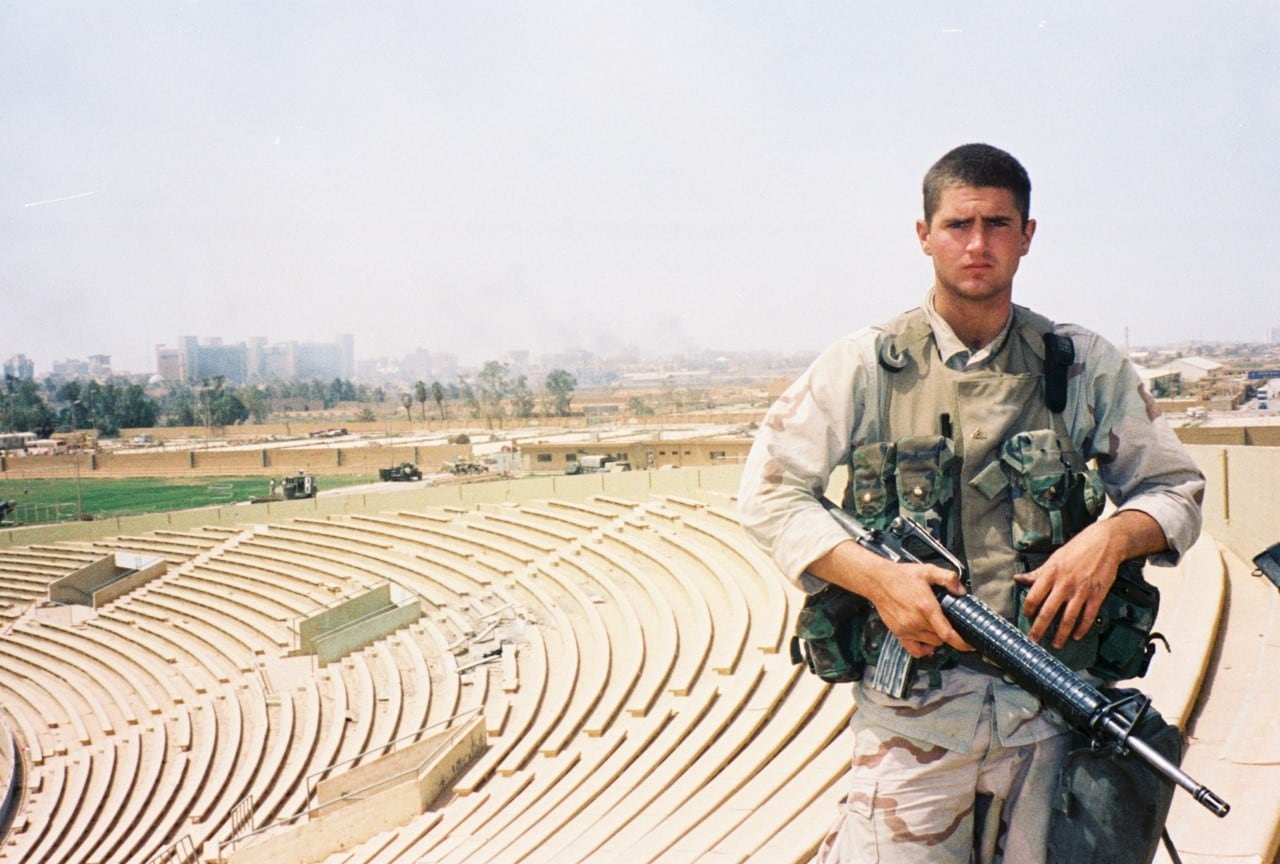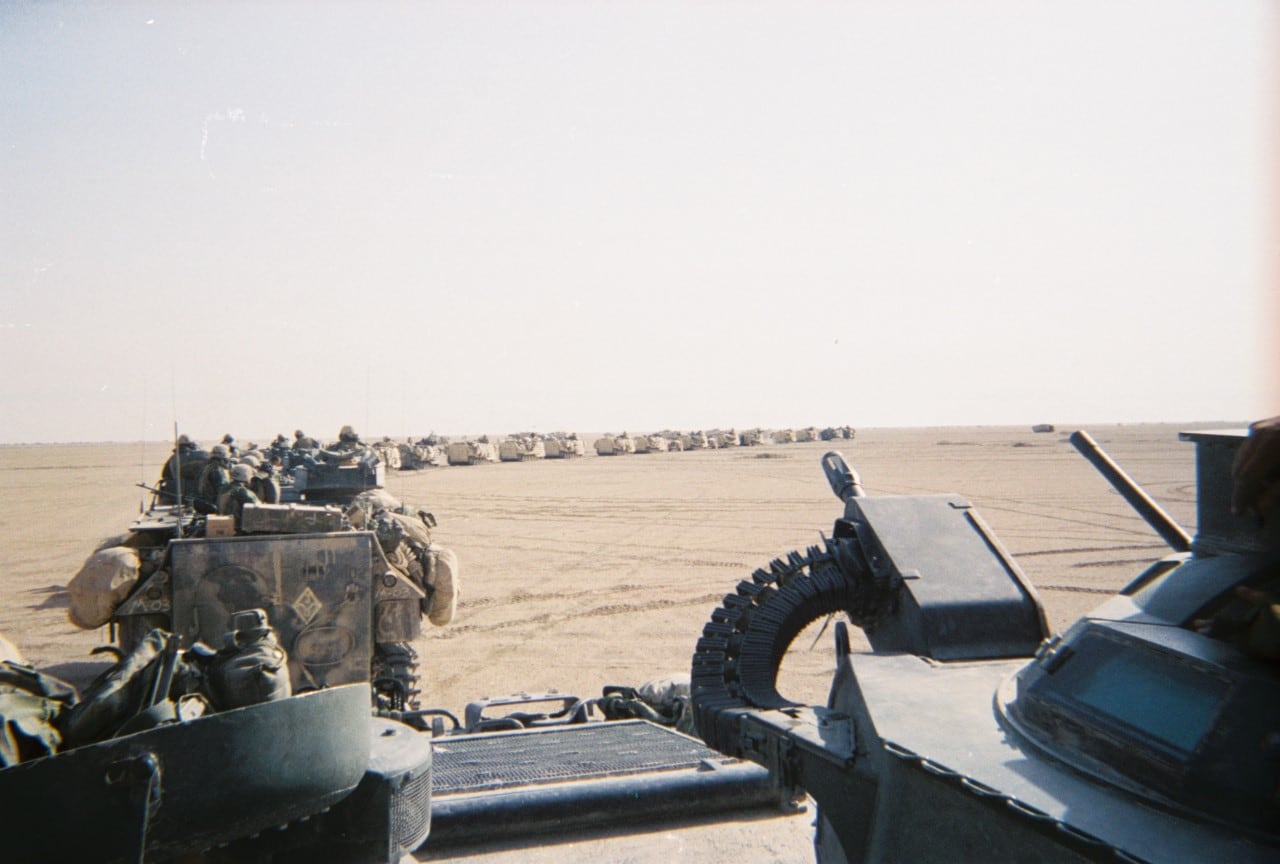The first person I shot with my M16 fell face first, like a sack of potatoes, I recalled, taking a long draw from a cannabis joint. From a hotel room in Twentynine Palms, California, I thought of the person I’d shot through the chest the month before, took a deep inhale and felt the vapors fill my lungs. The sweet smoke billowed from my breath like smoldering ruins of war.
It was September 2003. My fellow infantry Marines and I were only weeks removed from combat and thankful to be alive. Our regiment — the Magnificent 7th — had led America’s historic, albeit questionable, foray into Iraq in response to terrorist attacks that claimed the lives of thousands of innocent Americans. “Be the hunter, not the hunted,” Mad Dog barked at our final huddle, and on March 19, 2003, our unstoppable convoy of overwhelming force set off to invade Iraq as the “tip of the spear.”
Six months later and 8,000 miles away, on the other side of the globe, I stepped off a plane into California sunshine, bent over and kissed the tarmac, happy to be back on American soil.
As one of the first combat units home, there was considerable interest surrounding our return. A local radio station gave a play-by-play of our bus route while blaring Thin Lizzy’s “The Boys Are Back in Town.” Families and supporters lined the streets, cheering. With so much jubilation I didn’t even notice that things were different. That I was different.
I was, of course, thankful to be home, but I thought of my friend, Josh McIntosh, our beloved corpsman who misfired his 9 mm pistol into his own forehead, killing him. Everyone was far too happy, I thought. Didn’t they know what was going on 8,000 miles away, right this very moment? Didn’t they know that Doc Mac was dead? I thought about all the collateral death. All of the innocents killed. And the ringing in my ears.

Despite the hero’s welcome, three weeks later I found myself in an interrogation room on base, with no attorney, being grilled for hours by NCIS about smoking that joint. “I know you and your buddies were getting high,” my interrogator pressured, “your buddies gave us statements.” I faced 50 years at Fort Leavenworth if I didn’t cooperate, I was told. He started taking my fingerprints.
None of it made sense. I was a third-year standout Marine with high marks, the first junior marine of my peers to be promoted to non-commissioned officer. Earlier that summer, the Marines held a battlefield ceremony to cite me and others for “extraordinary heroism in action against enemy forces.” I couldn’t understand why I was suddenly being treated like a full-blown terrorist for smoking a joint. Besides, didn’t they know everything was different now?
In an instant, the Marine motto Semper Fidelis (Latin for “always faithful”) was reduced to a hollow recruiting slogan. The Corps that I loved and had given everything to quickly abandoned me when I needed it the most, after I had accomplished the mission. I was quickly processed without oversight and given an “other-than-honorable” discharge just months before my four-year volunteer enlistment was to end. “Troop Welfare,” the second pillar of Marine operations, was never considered.
Little did I know then that thousands of other veterans would meet a similar fate, or that 13 years later I would stand with Tulsi Gabbard and other members of Congress to tell my story on the front steps of the U.S. Capitol. For many years, my “other-than-honorable” discharge status caused me deep depression and anxiety. As one Vietnam veteran put it, “It hurts going around feeling I’m dishonorable.”
It wasn’t until Veterans Day 2013 when I was in law school and read the op-ed “The Vets We Reject and Ignore” that in a cathartic lightning-bolt type moment I realized I was far from alone in my struggle. For over a decade, I had felt invisible. I didn’t think anyone knew about my plight, much less would spend the time to write an article condemning exactly what I had endured — what hundreds of thousands of fellow troops had also endured.
I realized the fight was much bigger than me and in 2018 joined with the Veterans Legal Services Clinic at Yale Law School to file a class-action lawsuit on behalf of every sailor and marine with PTSD who was denied their honorable discharge since 2001. Since filing the suit, I have heard from countless veterans and families of veterans who didn’t survive.
I met Joanne Mills, whose late husband Peter MacRoberts hung himself in 1978 after he was given an “undesirable” discharge and two review boards denied his requests for an upgrade. His grandchildren, who were born years later and never met their grandpa, seek solace in the dead stump of a plant he once kept, salvaged by Mills, that they call the “dead daddy plant.”
Icarus Randolph was an infantry Marine who developed PTSD during his combat deployment to Iraq, and for self-medicating with cannabis on leave was given an other-than-honorable discharge. His sisters witnessed him be shot and killed by Wichita police on the Fourth of July in 2014 after being turned away from the VA due to his discharge status.
When President Lincoln delivered his second inaugural address in March of 1865, he spoke about healing the nation’s wounds. Part of the process of ending war, Lincoln knew, is “To care for [ALL] who have borne the battle.” The settlement recently reached in my lawsuit against the Navy is a major step in doing just that.
Now the real work begins to achieve discharge upgrades for the tens of thousands of veterans who, like me, served honorably but were administratively separated for minor infractions attributable to post-traumatic stress disorder, traumatic brain injury, or military sexual trauma. That is why I created Lincoln’s Promise, a nonprofit organization dedicated to providing free legal services to veterans with PTSD who need discharge upgrades so that they may begin to heal and move on with their lives.
We must care for all who borne the battle. After all, that is Lincoln’s Promise.
Tyson Manker is an attorney and author of the book “VA Handbook for Veterans and Advocates.” He served as an infantry Marine in Iraq and is the founder of Lincoln’s Promise.
Editor’s note: This is an Op-Ed and as such, the opinions expressed are those of the author. If you would like to respond, or have an editorial of your own you would like to submit, please contact Military Times managing editor Howard Altman, haltman@militarytimes.com.




